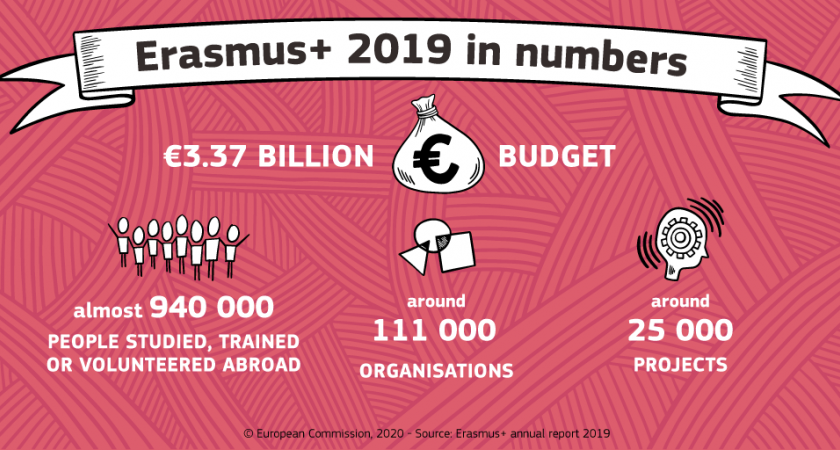About the program
Erasmus+ programme was created in 1987 as a student exchange programme. Although its outreach and objectives widened in the following years, the main idea remains the same: expanding the international cooperation between the universities. The name of the programme refers to the name of a Dutch philosopher, theologian and humanist, Erasmus of Rotterdam (1466-1536). It’s no coincidence: Erasmus, just like other renaissance representatives, gained education at many universities in Europe, while his views on education were rooted in the ideas of humanism. Erasmus+ makes is possible for the students to study or undertake an internship abroad. The programme provide opportunities for Europeans to study, train, gain work experience, and volunteer abroad. In the field of education and training, the Erasmus initiative is renowned for the opportunities it provides students to learn abroad, as well as the opportunities it provides for teaching staff in higher education.
The Erasmus+ programme now covers five major areas of education and training:
- School education opportunities for staff and institutions;
- Vocational education and training opportunities for students, apprentices, trainees, staff, institutions, and business;
- Higher Education opportunities for students, staff, institutions, and businesses;
- Adult Education opportunities for staff, institutions, and businesses;
- European Integration opportunities for academic and research staff and institutions.
Erasmus+ for Higher Education aims to modernise and improve higher education across Europe and the rest of the world. It gives students and staff opportunities to develop their skills and boost their employment prospects.
The advantages of talking part in the Erasmus exchange:
- Educational – possibility to compare the quality of studying, teaching methods and educational methods and functioning of higher education institutions in a foreign country
- Linguistic – the chance to become fluent in using a foreign language and terminology characteristic for the field of studies
- Cultural – getting to know the culture of a country, the lifestyle of the people, students’ life
- Life experience – developing the ability to deal with unexpected situations and gaining independence.
Participation in student mobility may turn out to be an invaluable experience, thus students are encouraged to take up the challenge and seize the opportunity to study abroad that is given to them by the European Union.

The 2019 annual report on Erasmus+ activities, as well as the first ever report on the European Solidarity Corps, are now available.
This year you can also get the statistics and the country factsheets in an easier format, no matter what device you are using. This type of interactive data is part of the European Commission's efforts to make content more accessible to more people.
Get the latest statistics on Erasmus+ on your desktop, laptop or mobile device
Erasmus+ 2019
The total budget for the Erasmus+ programme increases year on year. In 2019, it amounted to €3.37 billion - €547 million more than 2018, representing an increase of 20%. With this budget, Erasmus+ supported
- around 940,000 learning experiences abroad
- provided funding to around 25,000 projects and 111,000 organisations
European Solidarity Corps 2018-2019
The first European Solidarity Corps report covers the first 15 months of implementation of the European Union’s new programme dedicated to supporting the engagement of young people in solidarity activities.
Between October 2018 and December 2019, 2,300 organisations requested support for their projects in the solidarity field and 3,750 such projects received funding totalling €113.4 million.
By the end of 2019, grants awarded under the European Solidarity Corps generated specific solidarity opportunities for 27,000 young people.
The 2020 Erasmus+ annual report reveals that, despite the challenges posed by the COVID-19 pandemic, the program facilitated nearly 640,000 learning experiences abroad, offering financial support to 20,400 projects and 126,900 organizations. The transition to online education underscored the significance of digital solutions for teaching and learning. Erasmus+ had a total budget of €3.78 billion in 2020, representing a 15% increase of €506 million compared to 2019. Remarkably, after 33 years of operation, Erasmus+ demonstrated resilience in the demanding circumstances of 2020, backing a cumulative total of 11.7 million participants since its inception in 1987.
During 2020, the Erasmus+ program extended its reach to a substantial number of participants and beneficiaries:
- In the realm of higher education, over 323,000 students and trainees, along with 44,000 staff members, engaged in educational, training, or teaching experiences abroad;
- There was co-funding for more than 185,600 mobility activities for learners and staff in vocational education and training;
- Nearly 180,000 young individuals and youth workers received support through Erasmus+, participating in youth exchanges or accessing opportunities for youth workers;
- The European Week of Sport achieved a milestone, attracting over 15.6 million participants from Europe in 32,600 events.
More information available HERE




